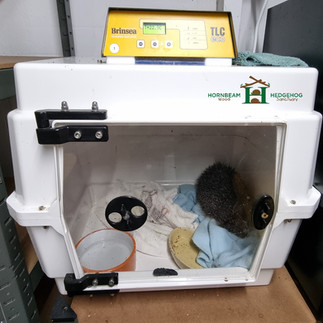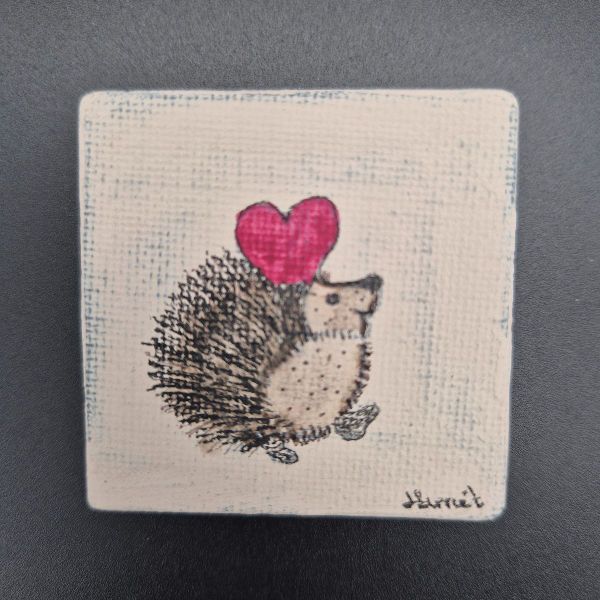Hornbeam Wood Hedgehog Sanctuary Volunteers: Spotlight on Margaret & Irene
- HWHS

- Mar 29, 2024
- 5 min read
Updated: Jun 6, 2024

Margaret and Irene
Margaret started her Hornbeam Wood Hedgehog Sanctuary (HWHS) volunteer journey by manning the stalls at fairs and fostering hedgehogs. Thankfully, due to the building of the overwintering shed, all hedgehogs can be housed in the sanctuary now. Margaret now volunteers seven days a week to care for rehabilitating hedgehogs. She loves the sanctuary, especially in the summer and helps to maintain the upkeep of the numerous buildings and hutches.
Irene volunteers weekly also caring for the rehabilitating hedgehogs and will often be on call for additional assistance such as, extra days or building disabled hedgehog gardens. Irene also volunteers as one of our craft volunteers that makes items solely for sale on our website and in our sanctuary's gift shop, as well as manning our stall at fairs. Additionally, when hoglets arrive orphaned and require 2 hourly feeding, Margaret and Irene have gladly taken on the challenge.

Why do hedgehogs require rescuing?
Rescued hedgehogs are usually discovered in the daytime, either lying on their side, or walking with wobbly legs and unusual behaviour.
Rescue calls to HWHS are taken from members of the public who have discovered a hedgehog, and they require either advice or need to ascertain whether they require rescuing.
Why do we rehabilitate hedgehogs in the overwintering shed?
HWHS has 33 hutches in the overwintering shed, and as the name suggests it is used to house hedgehogs that do not weigh enough for hibernation, usually less than 400g. They are taken into the overwintering shed as they have not gone into hibernation and are still searching for food or contracted an illness that prevents them. A hedgehog needs to have enough fat reserves to sustain it through hibernation. Illness or injury can disrupt a hedgehog's natural hibernation instincts. If a hedgehog is unwell, it may not enter hibernation as it needs to remain active to seek help or recover.
Hibernation usually takes place from November to March but is typically temperature dependent and milder weather tends to delay hibernation. The nest they build to hibernate in is called a hibernaculum, which helps to keep them warm when their body temperature drops during hibernation.
Female hedgehogs may delay or skip hibernation if they are pregnant or nursing young late in the season, as they need to remain active to care for their offspring.
Margaret and Irene’s Duties
Margaret is responsible for the Hog Hospital and together, Margaret and Irene, nurse the hedgehogs that are either outside in hutches during spring and summer or hibernating in the overwintering shed depending on the time of year. Injured or underweight hedgehogs and hoglets are housed in the Hog Hospital. If they are badly injured, they are initially taken to volunteer Vets for treatment and return to the sanctuary to rehabilitate.
All rescued hogs are weighed on arrival and treated for any fleas or ticks and bathed, as necessary. If they require to be in the Hog Hospital due to injury or illness, they are housed in an incubator with water and food. The bedding in the incubators is towels as they will not have any dust or fibres that could infect any injuries.
Margaret cleans and disinfects all incubators every day. Their bedding is changed daily to keep any injuries clean and hygienic. Their food and water are changed daily, with all bowls being sterilised daily too. All surfaces in the Hog Hospital are disinfected daily by Margaret. Margaret loves working in the Hog Hospital and seeing the recovery of the hedgehogs or hoglets to full health.
Throughout their stay, the hedgehogs are weighed twice a week to monitor any weight gain or loss and handling is kept to a minimum. Once they are at a healthy weight or their injury has healed sufficiently, they are transferred to hutches, outside in the spring or summer, or inside the overwintering shed in the autumn/winter.
These hutches require cleaning daily and clean bedding replaced. In the hutches, the hedgehogs have hay bedding which is grown in our sanctuary and a newspaper base layer for ease of cleaning. Again, the hedgehogs are given dry and/or wet food daily in clean, sterilised bowls. Each hedgehog is given their preference of dry and/or wet food as identified by Margaret and Irene.
Experience
Fortunately, Margaret and Irene are qualified in basic first aid, care and rehabilitation of hedgehogs as run by the Vale Wildlife Hospital & Rehabilitation Centre in association with The British Hedgehog Preservation Society.

Once the hedgehogs are fully rehabilitated, the hedgehogs are released into the wild, in numerous secret locations that will be suitable for their continued survival.
Occasionally, hedgehogs that are deemed disabled but unable to survive in the wild are able to live in one of our hedgehog gardens. Currently, we have Terry, the blind hedghog, who has been released on numerous occasions and keeps being rescued as he is injured or underweight.
Terry, the blind hedgehog
The Cost of Looking After Hedgehogs
We currently have a peak of around 80 hedgehogs at any one time and an average of between 30-90 in rehabilitation. Hedgehogs in rehabilitation are with us anywhere from 2 weeks to 6 months but normally at least 1-2 months. One hedgehog can easily eat close to an entire can of dog food, but it's normally just over half a can or a large bowl of hedgehog food. It's not unusual to go through at least 30-40 cans of food a day. This does not include the more expensive foods such as the critical care mousse and hoglet powdered food.
Donations are greatly appreciated and help us a huge amount. There are a lot of ongoing costs involved in rescuing the hedgehogs, but it costs about £20 a month just to feed and shelter a hedgehog in rehabilitation. You can make a difference and donate here.
There are many items we are always in need of such as cat (not fish) or dog jelly-based food, clean towels, newspapers, small plastic (not fabric) animal carriers, or large plastic tubs with sealable lids. We would welcome any donations to Total Looks, 71A High Street, Harpenden, AL5 2SL. Open Tuesday to Saturday, 11:00am to 3:00pm only.
Help us by volunteering
We would appreciate your help. There are a number of ways you can assist us to help ensure the hedgehogs we've saved get the best possible chance upon release back in to the wild. You can also support us by volunteering in other areas, or with a local release site. Please see our website for details by clicking here.
Thank you!
Our heartfelt thanks goes to Margaret and Irene for all their hard work at Hornbeam Wood Hedgehog Sanctuary. We really appreciate all the time that they give to us and our hedgehogs!
We are fortunate to have some regular volunteers in many guises, we appreciate you all.
#hornbeamwoodhedgehogsanctuary #HWHS #hedgehogs #rehabilitation #volunteer #volunteering #charity #rescue #wildlife #Harpenden #donate
Written by Lorraine Stapleton with thanks :)






























